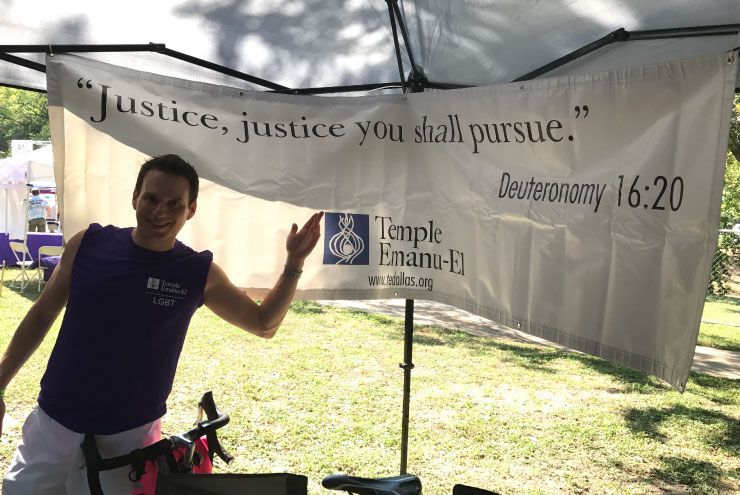By David Danish
The Shabbat music begins, but the usual exhale of my weekly worries doesn’t come. There is a tension in its place—a tightness. Typically, I find only the comfort of community and familiarity at a Shabbat service. But today, as I glance back at the strikingly oversized crowd, I am acutely aware that we are all targets. It’s an unwelcome feeling—one that I have not experienced since my days of fearing schoolyard bullies in the ‘80s and ‘90s.
Rather than leaning into the music, my eyes dart to the row of seats in front of me, assessing just how much space there is for me to drop to the floor if a shooter walked in and opened fire. I blink and snap from the moment. Wait…what? These are thoughts that have never crossed my mind before today—not in my 11 years of attending Shabbat services at Temple Emanu-El. Not in nine years of Jewish summer camp. Not in 40 years of being Jewish.
But on November 2, 2018, this Shabbat service was an entirely new experience for me—one that was horrifying in many ways. It was horrifying to acknowledge that, by simply stepping into temple, I was potentially putting my life at risk—that just days before, 11 of our brothers and sisters at the Tree of Life Synagogue of Pennsylvania were massacred. Eleven worshipers were executed while opening their hearts and minds to the notion that there is a gracious and giving higher power who helps sustain us all. It is horrifying to know that such a moment of grace, beauty, and love can be shattered by the serrated edges of ignorance, cruelty, and hate; horrifying to know that, just by being myself—a gay Jewish man—I have a bullseye on my back.
But the Sabbath prayers on this particular day were also gratifying—gratifying because of the solidarity of our congregation with the grieved and grieving, as well as with each other; gratifying because of the outpour of support from the Dallas friends, neighbors, co-workers, and even strangers who filled our sanctuary with their presence and love; gratifying in that our tradition is one in which the mourner’s prayer has no mention of death, only praise for the giver of life.
Yet, despite my gratitude to be in community, this Shabbat did not bring me peace or much-needed closure. Instead, a lingering sense of “Otherness” is what shrouded the days following our celebrations of the Sabbath—a feeling that continues to cloud my vision. Before the Pennsylvania shooting, I considered myself to be in a position of significant privilege. I recognized that I enjoyed a relatively fortunate standing within our society as a cisgender, white male, and I was learning (all too late in life) how to exercise that privilege for those in less-advantaged positions. I was learning how to be a real ally to those under attack in our current system, be it immigrants fleeing violence and persecution, women struggling for the right to control their own bodies and medical futures, or our transgender siblings, whose rights I, and my congregational backing, lobbied for at the Texas State Capitol less than a year before.

“Like the fellow congregants of the beloved 11 we lost in Pennsylvania, I am determined to move forward with an open heart and mind, as well as to open the hearts and minds of those around me.” -David Danish
Now, however, the “Otherness” of my Jewish and LGBTQ identities feels overwhelming. While I may not wear either identity on my sleeve, I have become severely aware of how both make me a target. These are identities that have enriched my life in so many ways—an intersection of which I’ve been particularly proud. Being a member of the Jewish LGBTQ community has afforded me the opportunity to feel embraced by my spiritual community, to support others on their individual journeys and coming out processes, and to deconstruct the psychological fences that allow people to maintain their bigotry by refusing to put a name and a face to the labels they fear.
With the devastating mass shooting at the Pulse nightclub in Orlando, and now at the Tree of Life Synagogue, it would be easy for me to hide my “Otherness,” to be bullied into living in fear, and to forever forgo the peace that my faith brings me. But like the fellow congregants of the beloved 11 we lost in Pennsylvania, I am determined to move forward with an open heart and mind, as well as to open the hearts and minds of those around me. I will use my intersecting identities to help turn the conversation toward understanding, empathy, and what it means to stand together as a nation. I will initiate dialogue surrounding my LGBTQ identity with friends and family, regardless of their affiliation. I will do the same in terms of my Judaism and its place in America. I will advocate for anyone and everyone who has been subjected to the status of “Other” by the toxic cauldron of hate that is bubbling over. Guided by my faith, I will forge these conversations until we have moved beyond a place of mere “tolerance,” have achieved true respect for and understanding of one another, and have reached a point where everyone can embrace their beautifully diverse identities with pride instead of fear.







